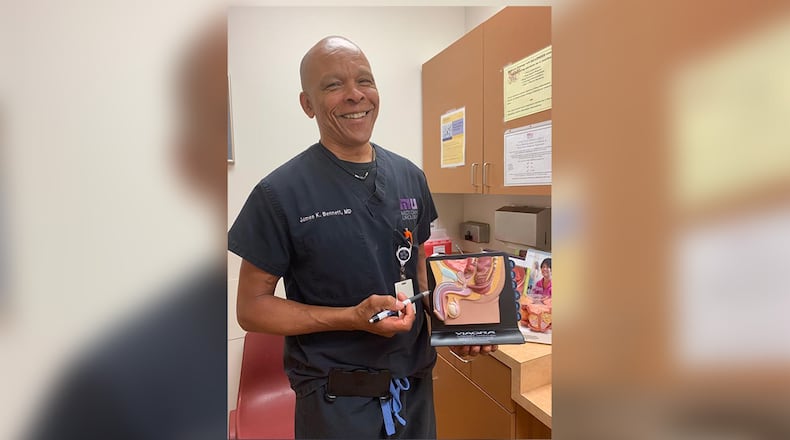By the mid-1980s, Dr. James Bennett was a surgical resident strolling the urology floor at Grady Hospital when he first noticed the huge number of African American men with advanced prostate cancer. In fact, he soon learned that the numbers weren’t all that unusual.
At the time, black men had about a 60% higher incidence rate for prostate cancer than white men and were twice as likely to die from the disease.
The numbers haunted him.
Why weren’t black men being diagnosed sooner? How could he change that?
Years later Bennett was finishing up his residency at Emory University School of Medicine, when he noticed women’s health awareness was gaining traction and breast cancer, in particularly, had a strong advocate in the Susan G. Komen Foundation.
“There was no such advocacy group for men,” Bennett said. “I decided then that maybe the answer for better men’s health was in a similar grassroots effort.”
After consulting with community leaders, he launched HIM or Health Initiative for Men.
RELATED | A mother and her daughters bare all to help prevent breast cancer
It was 7 a.m., three hours before the scheduled start time, when men began lining up, stretching for nearly four blocks to get screened for all manner of disease: Prostate and colorectal cancer. Diabetes. High blood pressure. When Bennett and his army of volunteers finished up eight hours later, they’d screened more than 2,000 men and still had to turn some away.
Nearly 30 years later, the need is still great, and Bennett, co-owner of Midtown Urology, is still at it.
Credit: The Atlanta Journal-Constitution
Credit: The Atlanta Journal-Constitution
And so come Sept. 7, the day he has set aside for another Men’s Health Summit, he will set up shop at Clark Atlanta University’s L.S. Epps Gymnasium. For eight hours beginning at 10 a.m. men can get free health screenings, haircuts and, yep, clothing.
Talking to him early this week, I wondered how anyone with his success even had the time to pull off such an event.
The short answer is Bennett has no other choice.
He grew up, he said, in segregated Elberton, Georgia, where there was only one African American physician for miles. Other than him, his grandfather, a saw mill owner, was perhaps the only other black man in the city who commanded a modicum of respect from whites.
When his father was killed in an accident at the mill, Bennett, then 12, and his three siblings were raised by his grandfather who taught them the importance of hard work and giving back.
Both were reinforced, he said, while earning a degree in 1976 at Clark Atlanta, where he heard from the likes of Dr. Hamilton Holmes and Dr. William Borders.
“Don’t forget you didn’t get here by yourself and you need to give back,” they told him.
RELATED | Hawks' campaign to fight prostate cancer results in $150,000 donation
It helped, Bennett said, that he launched his practice while many civil rights leaders still walked around Atlanta. He even removed Hosea William’s kidney after he was diagnosed with kidney cancer.
Bennett said he might have missed the message in that except Williams summoned him soon after and told him, he’d been advised to seek care at John Hopkins but when he thought about that, he told Bennett, he remembered all the beatings he’d suffered at the hands of white police officers and sheriff’s deputies and the fight for equal rights for African Americans.
What was all that about if I didn't have faith in you to do the surgery, Williams told him.
Then much later in 2009 during another encounter with a patient whose arm had been amputated, he said he finally worked up the nerve to ask what happened.
Doc my arm was beaten off when I was crossing the bridge in Selma, Alabama, the man told him. Today I got vindication. We have a black president.
“That same day Barack Obama was inaugurated,” Bennett said.
He breaks off talking. His voice cracks with emotion. Tears stain his face.
“I get sad just talking about it,” he said, gathering composure. “To me this is about doing the right thing.”
Two years after launching that first summit, Bennett changed the name to CHAMPS, Community Health Awareness and Men’s Promotion Summit.
RELATED | High-profile men and prostate cancer
The initiative has since evolved from just providing free health screenings to include mobile clinics, a barbershop initiative, free clothing and, through a partnership with fellow Clark alum Kenny Leon, the premier last year of “What’s Up Down There,” an educational play similar to the Vagina Monologues.
“It’s funny, it’s sad but it also rallies the audience around a call to action,” Bennett said. “It stresses … the importance of intimacy in relationships, caring for and supporting one another, holding hands, going out to a nice dinner.”
He wants to do more. He wants to make “What’s Up Down There,” available to audiences nationwide and partner with Clark Atlanta to promote men’s health awareness to younger populations.
That’s significant, Bennett said, because Clark and other historically black colleges like it are located in medically under-served neighborhoods where disease is rampant.
A partnership with all HBCUs would help widen his reach and thus improve the health of black communities across the country, Bennett said.
“We’re still very unhealthy,” he said. “The main reason for that is most men have the attitude they don’t get sick. They would rather take care of their cars than themselves.”
Most diseases, Bennett said, don’t develop overnight. They start in childhood.
“One in three guys in their late teens and early 20s already has cancerous changes in their prostate regardless of ethnicity,” he said. “By their late 30s, early 40s, certain groups progress to prostate cancer because of a lack of vitamin D, increased animal fats and excessive dairy in the diet.
“The message is African Americans have to do a better job of teaching children healthy habits early. We need to get back to encouraging them to be physically active and eating more meals at home.”
Find Gracie on Facebook (www.facebook.com/graciestaplesajc/) and Twitter (@GStaples_AJC) or email her at gstaples@ajc.com.
Men’s Health Summit
10 a.m. to 3 p.m. Sept. 7. Clark Atlanta University, L.S. Epps Gymnasium, 650 Student Movement Blvd. NW, Atlanta, GA 30314. www.champsga.org
About the Author
Keep Reading
The Latest
Featured






